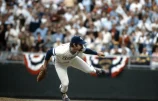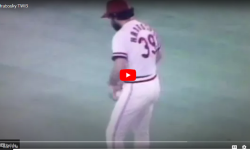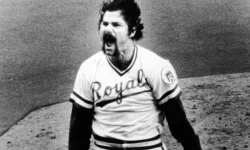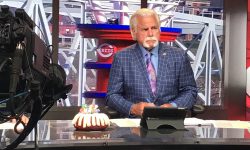via Fansided
He came to the mound with his hair wild, a Fu Manchu, and a famously angry stare. Before the first pitch of each appearance with the KC Royals, he stepped behind the mound, looked out to center field, vigorously rubbed the ball between his hands, slammed it into his glove, stormed to the rubber, and stared intensely at the hitter. Only then was he ready to pitch.
Al Hrabosky tells how he used this routine to focus and psyche himself up, how he came to be known throughout the game as “The Mad Hungarian,” and more on his website.
Although Hrabosky had one of the best names in club history and didn’t turn out to be the unhittable closer the Royals wanted when they picked him up in 1978, the lefthander was always interesting to watch.
The Royals were looking for a closer when they found Hrabosky. Mark Littell spent most of 1976 in that role, posting 16 saves and a 2.08 ERA, but the lone run he gave up as the club made it to the American League Championship Series for the first time was a series-winning home run by New York Yankees first baseman Chris Chambliss in the ninth inning of Game 5.
Whether that home run stuck with Littell or not, it stuck with Royals fans in 1977, and Littell fell to a 3.61 ERA and 12 saves. Doug Bird led the team with 14 saves and Larry Gura had 10. The Royals again lost the ALCS in five games. Littell pitched three innings in the series, giving up three runs (one earned) on five hits in two innings of a 6-2 loss in Game 2.
Future KC Royals closer Al Hrabosky first established himself with St. Louis.
Hrabosky had been selected in the first round of the 1969 amateur draft by St. Louis after a legendary career at Fullerton (Calif.) College and made his major league debut in June 1970. In 1974, he became a key part of the Cardinals’ bullpen, posting nine saves and a 2.95 ERA.
Hrabosky led the NL in saves with 22 a season later and posted a 13-3 win-loss record to lead the league with an .813 winning percentage. Toss in a 1.66 ERA and it’s no surprise he finished third in the NL Cy Young race.
But over the next two seasons, The Mad Hungarian regressed, logging 13 and 10 saves and posting ERAs of 3.30 and 4.38.
The KC Royals made a deal to get Al Hrabosky ahead of the 1978 season.
In a trade primarily involving struggling relievers, the Cardinals shipped Hrabosky to Kansas City in December 1977 for Littell and reserve catcher Buck Martinez. (St. Louis immediately flipped Martinez to Milwaukee for reliever George Frazier).
Hrabosky’s first KC appearance was shaky. With the Royals leading by two runs, he entered with one out and runners on first and second in the eighth inning at Cleveland April 9. Hrabosky struck out the first batter he faced, but then walked Ron Pruitt to load the bases and Paul Dade to force in a run. Gura came on in relief to end Hrabosky’s first outing as a Royal.
By the end of the season, Hrabosky was effective enough to post a 2.88 ERA, eight wins and 20 saves in 23 opportunities. The Royals again made it to the ALCS, but fell in four games to the Yankees. Hrabosky made three appearances but didn’t factor in any of the decisions.
As 1979 opened, Hrabosky was the club’s closer again, but over seven appearances in May gave up 10 runs in nine innings and took two losses, a performance which weakened his hold on the top spot in the pen. Hrabosky posted just one save in both June and July and his last of the season came Aug. 3. He finished the campaign with only 11 saves.
The season was also disappointing for Kansas City. The club finished second in the AL West, and the closer’s role became one of committee as Hrabosky, Marty Pattin, Steve Mingori, Eduardo Rodríguez, Renie Martin and Dan Quisenberry all picked up saves.
How did the 1977 trade for Al Hrabosky ultimately work out for the Royals?
Kansas City let Hrabosky leave as a free agent after the ’79 season. He signed with Atlanta and spent the next three seasons with the Braves, posting seven saves and seven wins before they released him in August 1982. He tried a comeback with the White Sox, signing a minor league deal with them in April 1983, but was out of baseball after a 5.82 ERA in 26 Triple-A appearances.
The Fu Manchu and the hair are white these days, but Hrabosky has remained around the game, working in the TV booth for Cardinals baseball on Bally Sports.
And Littell? He spent five seasons with St. Louis and saved 28 games (the same number he had with Kansas City) with a high of 13 in 1979. Remarkably, Littell’s ERA was 3.31 in five seasons with St. Louis and 3.32 in four seasons with Kansas City.




